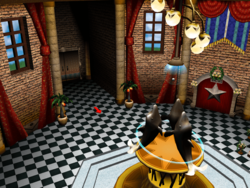Peach's Castle (tech demo)
- This article is about the tech demo. For other uses of "Peach's Castle", see Peach's Castle (disambiguation).
| Peach's Castle | |
|---|---|

| |
| Developer | Nintendo EAD |
| Publisher | Nintendo |
| Platform(s) | Nintendo GameCube |
| Release date | N/A |
| Genre | Platformer |
| Rating(s) | Not rated |
| Mode(s) | Single player |
| Media | Nintendo GameCube:
|
| Input | Nintendo GameCube:
|
Peach's Castle is a tech demo[1] for the Nintendo GameCube. In 2001, Nintendo sent various developers an interactive tech demo in order to show them the graphical capabilities of their new console as part of the Nintendo GameCube Software Development Kit. In this demo, the player controls a red arrow that can go through various places in Peach's Castle from Super Mario 64. Different rooms show different graphical effects, which includes the following: large textures, bumps and shadows, anti-aliasing, local lighting, projection textures, environment mapping, and maximum polygons.
The castle is referred to in the game as Peach Castel (castel is an old French word for castle).
RoomsEdit
#0 Peach Castel ENTRANCEEdit
A hub area with 6 doors, 5 of which lead to other rooms. This room features a lot of animations, as well as a map of the Castle.
#1 Huge Texture DOMEEdit
In this room, the walls and ceiling have various flowers on it as well as a mountain-themed background. The floor has a Starman with a flower in the background, which is made of a small 3-star texture. The purpose of this room is to demonstrate that the GameCube can support very large and massive textures with high amounts of pixels.
#2 Bump & Shadow SPIRAL STAIRCASEEdit
A dark place with a spiral staircase in the center. As the red arrow steps on it, it begins to jump slowly to the bottom where the door to the Hangar is. This room features Bump Mapping.
#3 Antialiasing HANGAREdit
As the name implies, this is an indoor hangar with an airplane. In this room the player can find a metal Warp Pipe which leads to the Cave. This room features anti-aliasing.
#4 Local Lighting CAVEEdit
The player appears on a wooden bridge which leads to a Goomba statue. The cave has some bulbs and colorful projector lights to light the path. The purpose of this room is to show the real-time lighting that the GameCube can render, with the rotating lights serving to show the moving shadow projections. Entering the green Warp Pipe will take the player back to the Entrance.
#5 Projection Texture CINEMA THEATEREdit
Shows a short looping video with prototype Nintendo GameCubes of various colors. This area demonstrates projected textures, and also shows that projected textures can be animated, projected over themselves at the same time, and projected over many objects in real-time.
#6 Environment Mapping METAL MARIO!!Edit
Contains a Metal Mario statue which utilizes environment mapping.
#7 Maximum POLYGONS How Many COINS?Edit
A white room with a ? Block at the center. Pressing while underneath will release a large amount of Coins and colored stars. The purpose of this room is to demonstrate the large amount of different polygons, models, and objects that the GameCube can support on one screen at any time. To exit the room, press . To control the camera, press .
FeaturesEdit
Camera Control ModeEdit
By pressing the player can control the camera's angle and position. To move it, move the and to control the angle.
Wireframe ModeEdit
Wireframe is a visual presentation of a three-dimensional object using narrow green lines that specify its each edge. It can be enabled by pressing .
The wireframe mode also makes the GameCube a bit slower than without it (this can be seen on the Lag meter). This is most notable in the How Many Coins? room.
Pause MenuEdit
On the Pause menu the player can set Mip mapping, Rendering, Debug information display, Lag meter display, Gamma correction, an option to enable or disable the background music, and Sound Effects. It can be accessed by pressing .
The player can go to the Main Menu, where they are able to choose the following modes: Normal Demo (default, the player is able to control the red arrow to explore the Castle), or Auto Demo (the camera is controlled automatically and the rooms are changing as some time passes).
DoorsEdit
While the next room is loading, instead of the loading screen, the arrow "knocks" the door until it loads. It can be seen that the lighting is added when the arrow stops.
ControlsEdit
- - Jump (How Many Coins? only)
- - Enter Camera control mode, exit room (How Many Coins? only).
- - Enter Camera control mode (How Many Coins? only).
- - Enter Wireframe mode.
- - Resets the camera behind the player.
- - Enter Pause menu.
- - Move the arrow, move the camera (not vertically).
- - Rotate the camera (in Camera control mode it's less limited).
GalleryEdit
ScreenshotsEdit
Sprites and ModelsEdit
Goomba rock formation
MediaEdit
| Peach's Castle - Entrance theme | File info 0:30 |
| Peach's Castle - Dome theme | File info 0:30 |
| Peach's Castle - Spiral Staircase theme | File info 0:30 |
| Peach's Castle - Hangar theme | File info 0:30 |
| Peach's Castle - Cave theme | File info 0:30 |
| Peach's Castle - Cinema Theater theme | File info 0:30 |
| Peach's Castle - Metal Mario theme | File info 0:30 |
| Peach's Castle - How Many Coins? theme | File info 0:30 |
